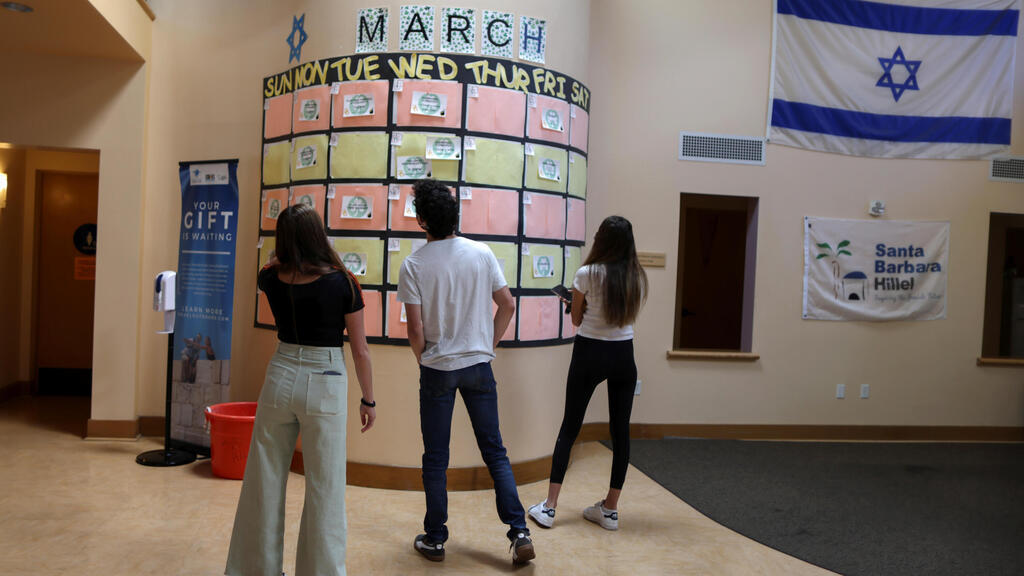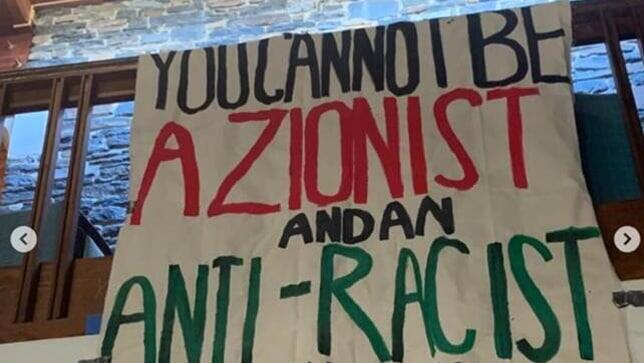Anti-Israel incidents on U.S. college campuses nearly doubled during the 2022-2023 academic year, according to a new report by the Anti-Defamation League. In total, there were 665 anti-Israel incidents on college campuses throughout the United States from June 2022 through May 2023.
More stories:
The recent anti-Israel activity on U.S. college campuses was defined by the vilification of Zionists and expressions of support for violence and terrorist organizations, the annual report from the ADL Center on Extremism, released late Tuesday, said.
Anti-Israel rhetoric and activism includes "strident and biased criticism of Israel as well as antisemitism -- such as efforts by anti-Zionists to exclude Zionists from campus life," according to the ADL.
"The report is a snapshot of the growing, radical movement to place opposition of Israel and Zionism as core elements of college life. For some students, it may feel like a requirement for full acceptance in the campus community," the ADL noted.
The incidents highlighted in the report include expressions of support for U.S.-designated terror groups that target Israel, and continued antisemitic messaging geared toward ostracizing Zionists and Zionism from campus life.
“Every year, young Jewish people go to college with the hope that their Jewish identities, including their connection to the Jewish state, will be welcome on campus,” said Jonathan Greenblatt, ADL CEO. “This sense of community is increasingly at risk as concerning anti-Israel incidents increase. University leaders must respond effectively to this hatred so that Jewish students feel safe.”
The report said that there were a total of 665 anti-Israel incidents across the United States during the 2022-2023 academic year. These included nine incidents of vandalism, 24 incidents targeted verbal or written harassment, 303 anti-Israel events, 326 protests and actions, and three BDS (Boycott, Divestment, and Sanctions) resolutions or referenda.
2 View gallery


Jewish students at the University of California campus at Sant aBarbara
(Photo: Reuters)
Although the total number of incidents nearly doubled from 2021-2022, they remained similar in two major categories: the number of physical assaults declined from one to zero, and instances of vandalism declined from 11 to nine. However, the number of BDS resolutions surveyed across undergraduate institutions, faculty/staff unions and graduate student programs fell, from 20 to three. All three resolutions passed in undergraduate student bodies. Additionally, there was a small increase in instances of harassment, from 19 to 24, according to the report.
The report suggested that the overall increase in anti-Israel incidents "is likely due to various factors, including continued momentum-building in the anti-Israel movement generally. While assaults and vandalism dropped, the small increase in harassment could suggest that campus activists are becoming emboldened in other ways."
The report highlighted several incidents that highlight explicit rhetoric and activism against Israel on campuses:
• In June 2022, The Mapping Project was promoted by National SJP (Students for Justice in Palestine) and several of its campus chapters including Tufts SJP, Wellesley SJP, Rhode Island School of Design SJP and George Washington University SJP. On September 28, 2022, the editorial board of the Wellesley College student newspaper endorsed it, though later retracted it after pressure. The Mapping Project is a website that contains an interactive map pinpointing the locations of many Boston-area Jewish communal and other organizations, including elementary schools, that the anonymous creators believe are responsible for the “colonization of Palestine” and other perceived “harms,” among which they include Zionism. The website includes a call to “dismantle” and “disrupt” all the named organizations.
• Resistance News Network (RNN), a radical anti-Zionist English-language channel on Telegram and Instagram that promotes violence against Israel, emerged in October 2022 and was disseminated by many anti-Zionist student groups, including Claremont SJP, Not In Our Name CUNY, Marquette SJP, University of Southern California SJP, California State University-Northridge SJP and Wellesley SJP. The channel’s posts include the explicit promotion Hamas and Popular Front for the Liberation of Palestine (PFLP), which are designated in the U.S. as terrorist organizations, as well as many images of individuals with guns and the depiction of rockets being fired at Israel.
• During the summer of 2022, a social media channel and website called Jisr Collective became increasingly popular among campus anti-Zionist activists and was promoted by some SJP chapters, including at Wellesley College, University of Wisconsin-Madison, University of Washington, California State University-Northridge and University of Southern California. Jisr Collective, which was banned from Twitter in November 2022, explicitly asserted opposition to Israel’s existence; conveyed support for all forms of “armed resistance” to Israel; and expressed fierce opposition to “normalization.”
In addition, Berkeley Law SJP announced in August 2022 that they successfully convinced several campus student groups to adopt a bylaw pledging not to work with, invite to speak, or co-sponsor events with anyone who has, or continues to, “hold views in support of Zionism.” "The adoption of the bylaw by groups representing various communities is an example of broad progressive support for anti-Zionist rhetoric and policies," according to the report.
The data on campus anti-Israel incidents used in the report was compiled by monitoring publicly available information posted online by anti-Israel activists themselves. Other information came from incidents reported to ADL by students and faculty, as well as student newspapers and other news media. All incidents were substantiated by primary sources and no unsubstantiated incidents were reported.


